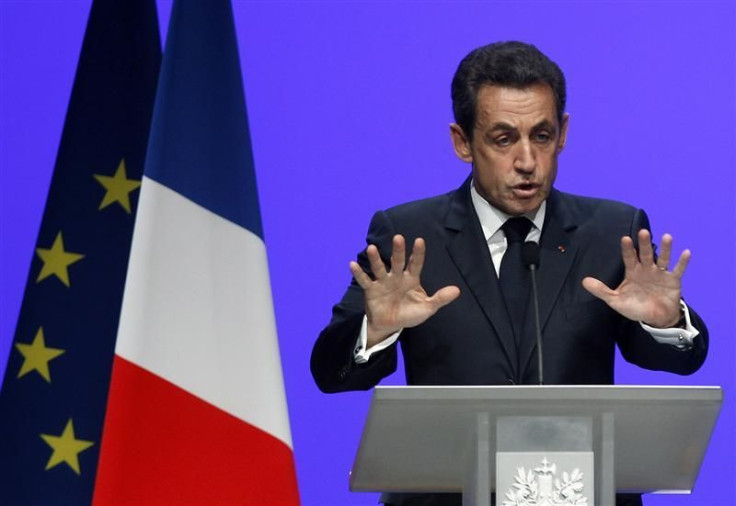Sarkozy Lashes Out At Free Trade, Immigration

(Reuters) - President Nicolas Sarkozy, recasting himself as France's savior from low-cost competition and high immigration, threatened to disregard European limitations on protectionism as he sought to give his re-election campaign a second wind Sunday.
Going out on a limb that risks angering France's European partners, Sarkozy said it was time to support local companies and stop the uncontrolled influx of immigrants and cheap imports that demonstrate Europe's lack of protectionist controls.
Addressing some 30,000 people at a vast conference centre just outside Paris, Sarkozy vowed to pull France out of the European Union's open-borders Schengen zone unless there was progress over the year ahead in fortifying Europe's borders.
He also proposed a European law similar to the Buy American Act which would require governments to favor European-made products in their purchases, and said that without advances in that area, France would start applying the rule unilaterally.
I want a Europe that protects its citizens. I no longer want this savage competition, Sarkozy said to roars of support.
I say no to a Europe that opens up its markets when others don't. Such behavior does not mean accepting free trade, it means accepting being a Europe that is a sieve.
Sarkozy's speech lacked the economic policy ideas many observers had expected following hints he would unveil his full program at Villepinte for the April/May election.
Opponents say the lack of a complete manifesto makes Sarkozy's campaign look haphazard and ill-prepared.
Instead, his targeting of Europe as a scapegoat for France's economic problems seemed clearly geared towards the far-right voters whose support he sorely needs if he is to close the gap with Socialist frontrunner Francois Hollande.
Today he is clearly addressing the France that voted no, speaking both about immigration, which is normal, and protectionism, which is becoming a popular issue in France, said Jerome Sainte-Marie of polling firm CSA, referring to those who voted against key European treaties on sovereignty concerns.
Sarkozy is running for re-election with the double handicap of some of the worst popularity ratings of any French president and the same deep-rooted public anger over the sickly economy that has felled leaders across Europe.
He managed to narrow Hollande's poll lead by a few points when he launched his campaign in mid-February with his trademark oratory verve, but has since slipped back in voter surveys. Heckling by left-wing militants has also created bad publicity.
DANGEROUS ULTIMATUM
Stronger at the podium than Hollande, who is a bland public speaker, Sarkozy is hoping to stay in the headlines and make his rival's weeks-old campaign manifesto look stale by drip-feeding his policy proposals week-by-week.
His protectionist push on Sunday follows a pledge to hold regular referendums on policy and toughen up unemployment benefit rules so jobseekers must undergo training to get their pay. He has also vowed to halve annual immigration flows.
Europe must not be a threat, it must protect, Sarkozy said in Villepinte. Europe cannot be the only region in the world with such badly respected borders, which so little defends its interests, which so ignores the anxiety of its citizens.
His threat to act unilaterally if necessary to protect the French economy marked a turnaround from his 2007 promise that on his watch, France's commitment to EU treaties would never again be thrown into question, and risks friction with Brussels.
Rather than saying that France can only work in Europe, it's almost saying the contrary, that Europe must do what France tells it to, otherwise France will do so anyway, said political analyst Roland Cayrol. This kind of ultimatum is something that could cause problems in the working of the European Union.
Nervous about a gaping trade deficit in France, Sarkozy has in the past criticized perceived U.S. protectionism, pointing to specific contracts such as a $50 billion refueling plane contract in 2010 that he said favored Boeing.
He has also previously floated the idea of suspending the EU's 25-member Schengen treaty on open-border travel, prompting the European Commission to unveil proposals that could see border checks reinstated if member states persistently fail to protect the bloc's external frontiers.
The topic is sensitive given the free movement of people is one of the cornerstones of European integration.
Sarkozy, who is around 2 points behind Hollande in polls for the April 22 first round and 10-12 points behind in polls for a May 6 runoff, was backed on Sunday by such characters as former first lady Bernadette Chirac and actor Gerard Depardieu, who both made speeches in his support.
He suffered a setback, however, when two popular ex-ministers, both of them centrists that were part of a diverse cabinet early in his term, declined to support him at the rally.
Former environment minister Jean-Louis Borloo said Sarkozy had only his cautious support, and former sports minister Rama Yade said she could not support such a right-wing campaign.
(Additional reporting by Lionel Laurent and Jean-Baptiste Vey; Writing by Catherine Bremer; Editing by Sophie Hares)
© Copyright Thomson Reuters 2024. All rights reserved.




















